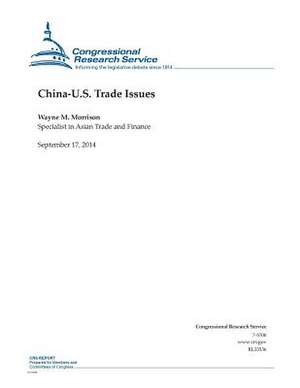China-U.S. Trade Issues
Autor Wayne M. Morrison, Congressional Research Serviceen Limba Engleză Paperback
Preț: 125.52 lei
Nou
Puncte Express: 188
Preț estimativ în valută:
24.02€ • 25.21$ • 19.94£
24.02€ • 25.21$ • 19.94£
Carte disponibilă
Livrare economică 20 martie-03 aprilie
Preluare comenzi: 021 569.72.76
Specificații
ISBN-13: 9781502507884
ISBN-10: 1502507889
Pagini: 58
Dimensiuni: 216 x 279 x 3 mm
Greutate: 0.16 kg
Editura: CREATESPACE
ISBN-10: 1502507889
Pagini: 58
Dimensiuni: 216 x 279 x 3 mm
Greutate: 0.16 kg
Editura: CREATESPACE
